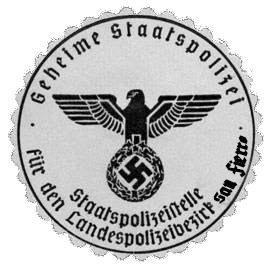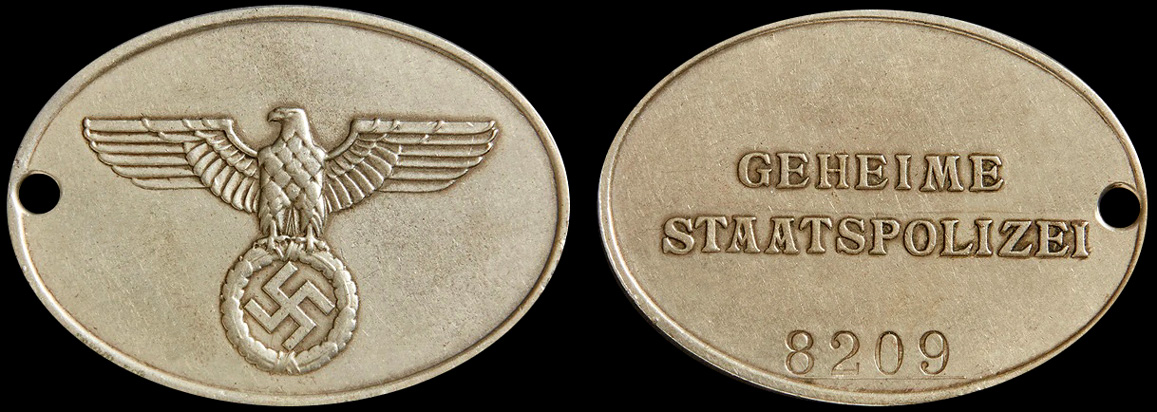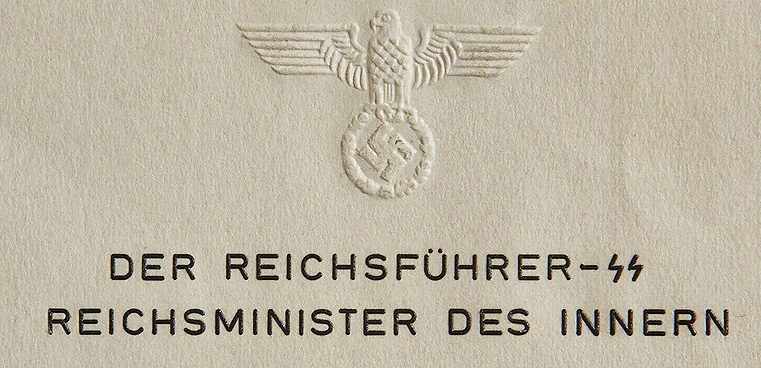Interview with Karin, office worker for the Gestapo in Aachen, Germania Club, 1986.
[Above: Gestapo official seal.]


Interview with Karin, office worker for the Gestapo in Aachen, Germania Club, 1986.
[Above: Gestapo official seal.]


Karin: It was very nice for me. My father hired men for a mining company nearby and my mother stayed at home since 1934. I was born in 1920 and was the youngest out of 4 children. I remember my father was a veteran of the first war; he was in an artillery regiment, just like his brother Franz Schaaf. He fell in 1918, my father kept a memorial to him in our living room.
Aachen was a very lovely town, I remember going for walks in the center and smelling all the food being sold, especially cream cakes and printen [printen are a type of German gingerbread-Ed.]. My mother would always buy us a treat when we visited the center. I will say under Hitler the city was always clean and vibrant, my parents said before 1933 it was crime-ridden and dirty.
My father always complained, I remember, that the city was infested with Marxists, and he thought them to be anti-German. That is why he joined the Party in 1925, and he held a special party pin I remember. It gave him much respect, and he moved into the labor front for the Koln-Aachen region. This gave him a very high paying job, and we were able to buy a car in 1937.
This was unusual for Germany, as many people could travel freely by train, streetcars, boats, or buses. So not many wanted or needed cars, not like it is here, Germany was a small country even back in my day. You could travel from top to bottom pretty quickly; the rail system was top notch.
I was 13 when Hitler was elected, and I remember all the celebrations in the streets and the Marxists who were forced to leave. They cleared our school of any Marxist teachers. I remember the school head had a big assembly for us all, and Party men were there. They told us that there were people in our midst who hated Germany and German culture, and no more would they threaten us.
This was in 1934 I believe, I had started what was the equivalent of high school. Things seemed to move very fast then, I was training for office work. Because of my father I was offered a job as a file clerk for the local Party district office. I graduated in 1937, took a cruise to Italy as a vacation and then started working as soon as I got back.
I worked for the district sub-leader's office, and then was hired for the local police which was connected to the Gestapo. I keep this quiet of course, so do not tell anyone [her last name is redacted-Ed.]. That was hard work but the pay was better. I stayed in this office until it was bombed, then I was sent to work for the mine as a secretary in my father's office.
What was the mood like when war was declared?
Karin: I was working then, I remember I came to the office to see everyone in a nosey mood. They had their ears glued to the radio and my friend told me we attacked Poland. This was on September 1, I believe, and then on the 3rd the radio announced Britain and France had declared war on us.
I will say many in Germany were in disbelief, and there was a certain fear in the western part of the Reich. We had the mines nearby and factories which could be bombed. I remember being fearful because the French had launched some operation against us.
There were reports of heavy fighting in that area I remember, and we thought the army might not hold them. I had a brother who was called to duty shortly after the war began and he had to leave for training. He eventually became a radio person and was badly wounded in the east during the summer of 1944, keeping him home for the rest of war.

[Above: Gestapo identity disc - front/back.]
What was it like working for the Gestapo?
Karin: Not as sinister as it may sound, this was the state police and the office I was assigned to had jurisdiction for our state or gau. While my time in the political office dealt with only Party matters like lost party badges and finances, the police dealt with criminal issues.
The state police had to keep an eye on the former Marxists and those opposed to the state, which was not as bad as it is made out today. Our workload was light and mostly consisted of watching known opponents of the state. I typed up reports for officers who were assigned to investigate them.
The office also investigated former Red Front members, and would look into complaints of pro-Marxist sentiment and activities. I remember the first case I had to type up was a former leader who made threats to an employee. He was arrested for political intimidation but only given a light sentence. I remember seeing him brought in after his sentence and given a stern talking to by our section head.
Something worth saying is the police did not spy on people, they only acted on complaints by citizens. If someone seemed to be acting against the state, then the police would go check it out. It was fairly boring work as there was not this vast opposition as the papers try to present today. The whole Red Front was dissolved and many came to the SA or other organizations. My father hated that, he had many in his office who used to be red union men.
Now when the war started things changed, enemy agents were a threat in every area. The police then were very busy investigating claim after claim of foreign workers and prisoners of war. The government allowed many workers to come in, and even let prisoners out to work. In 1941 I remember there was an agent caught in Aachen with maps showing places for the British to bomb. They were sent on to Berlin where I am sure they did not have a pleasant fate.
Aachen had no major war production so I always thought we were safe from bombs, but I was wrong in this. We were bombed very early in the war I remember, and then in 1941 a few big ones happened. The real terror bombs came in 1943 and 1944; they destroyed large parts of the city. I remember that special measures were taken to protect the many ancient churches; one was Charlemagne's resting place. Teams were put on standby each raid to put out fires. One time I remember the sirens did not go off and it was investigated as sabotage by enemy agents.
A myth I must bring up is that no one wore the leather trench coats they show on Hogan's Heroes. Our officers just wore regular suits with a special badge to show. Some wore police uniforms depending on the branch they were in. I know we always had to be on guard for spies; we had special training on how they would send handsome men to try to gain information. My time was boring in this way, no one ever tried to get information from me.
Did you still live in the city when the battle for Aachen started, and what was the end like?
Karin: No, our home was bombed in 1944 and that was it for us. My older sister was working in a factory up north; another brother was away in the labor service building the defenses in France. We had many air raid shelters that protected us, but the raid that hit our home also hit the office I worked in.
My father decided to get us moved away as it was very stressful being under the bombs. We had all had enough, we moved to Duren so I missed the battle. Most all civilians left the city as the Americans came closer. It was in the fall of 1944 I believe.
By this point I will tell you we all just wanted it to be over, for the vast majority of Germans we knew that the war was lost in the summer of 1944, and any hope of victory was gone. We still had a tiny bit of hope for the wonder weapons, but pretty much thoughts of victory were gone.
I was sad to leave Aachen, but at the same time the city I knew was gone, most buildings were only shells. It was not safe; I remember a building wall fell down on a family friend walking her dog. The fire service had to save her, and she was banged up pretty good with many broken bones.
I could hear the fighting all the way in Duren, and I went to work for my father in his office. My mother sewed for the military, everyone did their part. We were with many other people who had fled the larger cities; we were able to get some sleep finally.
The Americans came towards the end, and I remember I was not happy to see them at all, all young women were told to stay hidden. Rape was a very real possibility and I met girls after the war that had been attacked. I remember seeing the people roughly treated when we had to present papers to soldiers.
I saw soldiers kick prisoners also, thinking how unnecessary that was. Anyone who protested was shouted at or hit. My brother was taken away as he was in the army, but had a problem walking from being wounded. They were very harsh with him, making him stand and walk when they saw it was hard. There was nothing anyone could do for any of them. If you protested they would come for you, so you learned to keep quiet and agree with everything.
I can tell you the feeling at the end was deep sadness at having lost the war, but also, a great sense of relief that it was finally over. We did have to endure very inhumane treatment for awhile, and physiological hate by having German crimes shown to us at every chance, and if you dared question any of it you were taken away.
I learned my boss and many of the people I worked with were taken to camps, I was honest and said I worked for the police, and I was questioned but was made a low offender so I was left alone.
We were very fortunate to have survived intact, when so many families did not. My brother healed well, and my parents moved back to Aachen. I got in touch with family that was here and I came to visit in 1949, and decided I would move here to get away from the threat of war.

[Above: Heinrich Himmler official letterhead.]